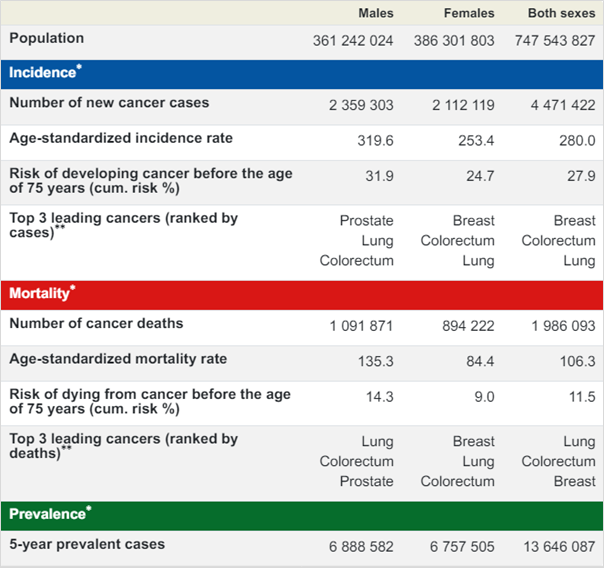HealthManagement, Volume 24 - Issue 3, 2024
In the ever-evolving landscape of oncology, Europe leads revolutionary changes aimed at improving patient outcomes through integrated care pathways, technological advancements, and personalised treatment strategies.
This editorial explores emerging trends shaping the future of cancer care across the continent, highlighting significant developments and their implications.

Europe faces over 1.9 million cancer deaths annually, with 4.5 million new oncological cases each year. 40% of these cancers are considered preventable through effective strategies.
This study is based on a comprehensive review of the current state of cancer care in Europe, drawing from data provided by the World Health Organization (WHO) and other authoritative sources. The focus includes examining prevention strategies, multimodal treatment approaches, and the role of technology, particularly AI, in enhancing cancer detection and treatment.
Integrated Care Pathways: A Holistic Approach
Cancer care in Europe has shifted towards integrated care pathways, encompassing diagnostic imaging, multidisciplinary teams (MDTs), and continuous patient monitoring. These pathways ensure a seamless and personalised care experience from prevention through post-treatment follow-up. This holistic approach enhances coordination among healthcare providers and significantly improves patient outcomes.

Digitalisation: Enhancing Accessibility and Efficiency
The digital transformation of healthcare is revolutionising cancer care delivery. Telemedicine platforms enable patients to consult with specialists from the comfort of their homes, reducing the need for travel and minimising delays in care.
Artificial Intelligence (AI) is playing a crucial role in this transformation, aiding in the interpretation of medical data, predicting patient outcomes, and optimising treatment strategies. These digital advancements bridge the gap between patients and healthcare providers, ensuring high-quality care is accessible to all, regardless of location.
The landscape of cancer treatment is being transformed by several breakthrough innovations:
- Early-stage cancer tests and liquid biopsies are paving the way for less invasive and more accurate diagnostics.
- CAR-T-cell therapy and immunotherapy offer new hope for patients with previously untreatable cancers.
- Predictive AI models enhance the precision of treatment plans.
- A seven-minute treatment jab and a breast cancer prevention tablet make treatment more accessible and convenient.
- Pancreatic cancer detection through genomic clues improves early diagnosis and treatment efficacy.
Multimodal Treatments: Combining Forces for Better Outcomes
The efficacy of cancer treatment is being significantly boosted by multimodal approaches combining surgery, radiation therapy, chemotherapy, and novel treatments like hormonal therapy and immunotherapy. This synergistic approach increases survival rates and enhances the quality of life for patients.
Precision Oncology: Tailored Treatment Plans
Precision oncology is at the heart of modern cancer care, emphasizing the importance of genetic sequencing in both diagnosis and treatment. By tailoring treatments to individual genetic profiles and understanding the genetic mutations driving a patient's cancer, healthcare providers can select targeted therapies that are more likely to be effective, thereby increasing the likelihood of successful treatment outcomes.
This approach improves treatment outcomes and minimises side effects, leading to a better quality of life for patients.
Ongoing Research and Development
Ongoing research and development are vital to advancing cancer care. Europe must continue to invest in clinical trials, biomedical research, and the new therapies. Collaboration between academic institutions, healthcare providers, and the private sector will drive innovation, leading to breakthroughs that improve patient outcomes and quality of life.
Patient-Centred Care: Empowering Individuals
A patient-centred approach is fundamental to the future of cancer care. Empowering patients with information, involving them in decision-making, and providing psychosocial support are all critical components of comprehensive care. Through education and shared decision-making, patients become more engaged in their care, leading to better health outcomes.
By focusing on the needs and preferences of patients, healthcare providers can deliver more compassionate and effective care.
A Collective Effort
Effective cancer care requires a multidisciplinary approach, with healthcare professionals from various specialities working together. Oncologists, radiologists, surgeons, geneticists, and support personnel must collaborate closely to develop and implement comprehensive care plans. This teamwork is essential for managing cancer as a chronic illness, ensuring that patients receive continuous and coordinated care throughout their journey.
At Affidea, we are committed to pioneering all these advancements. By leveraging cutting-edge technologies, fostering collaboration among healthcare professionals, and prioritising a patient-centred care, we strive to enhance the quality and accessibility of cancer treatment. Our dedication to innovation and excellence ensures that patients receive the most effective and efficient care possible, always accessible through our extensive network of Centres of Excellence in Oncology. Through our efforts, we aim to contribute to a future where cancer is more manageable, and patients can feel empowered to live healthier, fuller lives.
Disclosure of conflict of interest: Point-of-View articles are the sole opinion of the author(s) and they are part of the HealthManagement.org Corporate Engagement or Educational Community Programme.
References:
International Agency for Research on Cancer – WHO. From https://gco.iarc.who.int/media/globocan/factsheets/populations/908-europe-fact-sheet.pdf
Cancer today – WHO. From https://gco.iarc.who.int/today/en
6 experts reveal the technologies set to revolutionize cancer care. From https://www.weforum.org/agenda/2022/02/cancer-care-future-technology-experts/
10 new breakthroughs in the fight against cancer. From https://www.weforum.org/agenda/2024/01/cancer-treatment-and-diagnosis-breakthroughs/
AI projects are improving cancer screening and outcomes. From https://www.weforum.org/agenda/2021/07/ai-projects-improving-cancer-screening-outcomes/
Impact of artificial intelligence in transforming the doctor - cancer patient relationship. From https://www.esmorwd.org/action/showPdf?pii=S2949-8201%2824%2900004-3
Could we be on the cusp of ending cancer as we know it? From https://www.weforum.org/agenda/2023/01/breakthroughs-fight-against-cancer-astra-zeneca-davos23/
How biomarkers unlock fast cancer detection, improving outcomes. From https://www.cas.org/resources/cas-insights/biotechnology/how-biomarkers-unlock-faster-cancer-detection-improving




